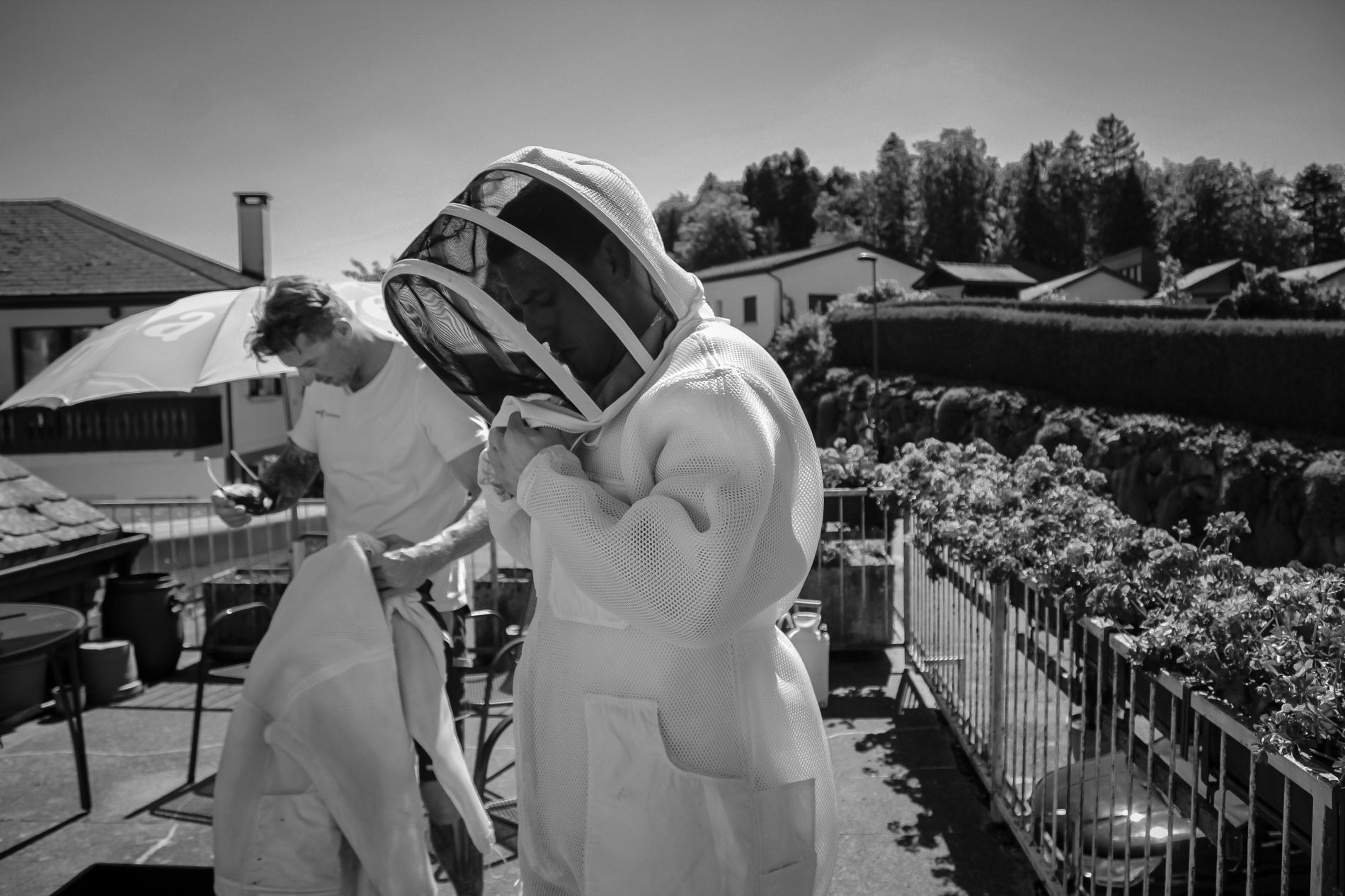
Fighting Asian hornets in Roggliswil
Have you discovered an Asian hornet's nest? We'll be on site quickly! Call now - Daily Mon-Sun 07:00-21:30. Contact us now: 058 510 22 54
Having the Asian hornet's nest removed
Vespa velutina, a hornet species originating from South-East Asia, has invaded Switzerland and the entire subcontinent through an extensive spread. Though benign towards humans, it has become notorious for its predation on honey bees, which has raised concerns among beekeepers. In a matter of hours, a limited number of these hornets can ravage and eliminate an entire colony of bees. If you have discovered a hornet's nest on your house, patio, shed, or in your blind box, contact our experts for hornet nest removal in Roggliswil!
Use the uncomplicated telephone service of the Hornet experts in Roggliswil and simply inform us at 058 510 22 54, we will be on site quickly so that you and everyone in your area feel completely safe again.
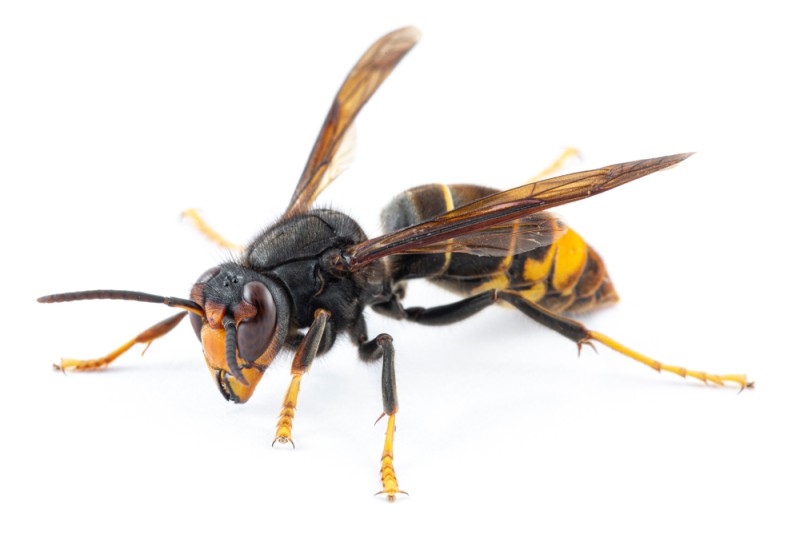

Appearance of the Asian hornet
Here are some characteristics that distinguish the Asian hornet:
1. Size: The queen can reach a length of about 3 cm, while the workers are slightly smaller and measure about 2.5 cm.
2. Color: The Asian hornet has a dark body that is almost black, with a yellow stripe at the back of the abdomen. Its face is orange-yellow.
3. Wings: The wings are dark and almost smoky gray.
4. Legs: The hornet has yellow tips on its legs, which is a striking distinguishing feature when it flies.
5. Nest: The Asian hornet's nest is often high in the trees, but it can also be found underground or in tall structures such as chimneys. It has an oval shape and is made of chewed wood, which gives the hornet a papery texture.
It is important to distinguish the Asian hornet from the European hornet (Vespa crabro), which is more harmless and a natural part of the European fauna. If you suspect you have found an Asian hornet nest near you in Roggliswil, you should report this to the local authorities, or using our reporting form, as they can spread quickly and be harmful to bees and other insects. To avoid being attacked by the flying inhabitants, you should hire a professional pest controller such as the Hornet Experts Roggliswil. We can identify the nest beyond doubt and take further steps to remove the Asian hornets professionally.
News about the Asian hornet in Roggliswil
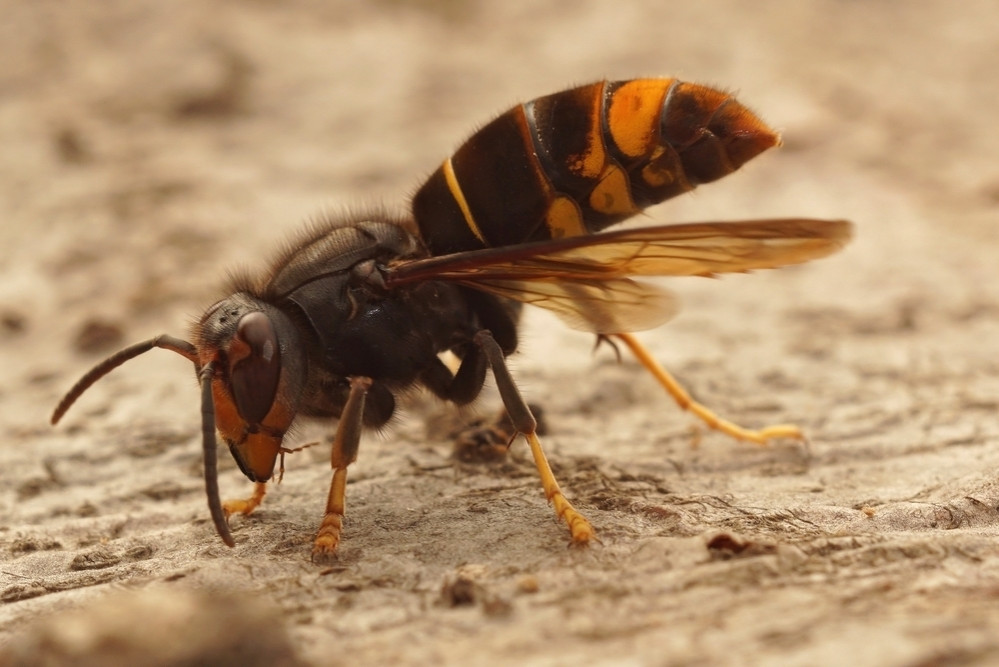
02.12.2025 Western Switzerland: Killer hornet eats bees
The territory of the Asian killer hornet has expanded considerably this year, with a notable increase reported in western Switzerland. This invasive species poses a significant threat to native bee populations, as bees make up the majority of its diet. The potential consequences are serious. Moreover, the hornet represents a danger to individuals with allergies to its venom.
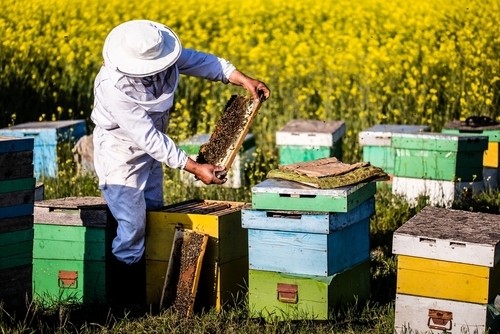
25.11.2025 Serious concerns about the bee population!
Asian hornets are inflicting significant harm on beehives across multiple parts of Europe, as reported by local beekeepers. Even a small number of hornets can destroy an entire bee colony within hours. This sharp decline in pollinators could have serious consequences for pollination, local ecosystems, and agricultural productivity.
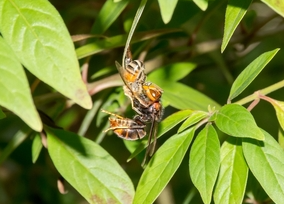
18.11.2025 Asian hornet doesn't just eat bees!
The danger it presents to insects is substantial!
The Asian hornet feeds largely on honeybees—up to 85 percent of its diet—alongside beetles and flies. This high level of predation not only poses difficulties for fruit growers but also further threatens already vulnerable bee populations.
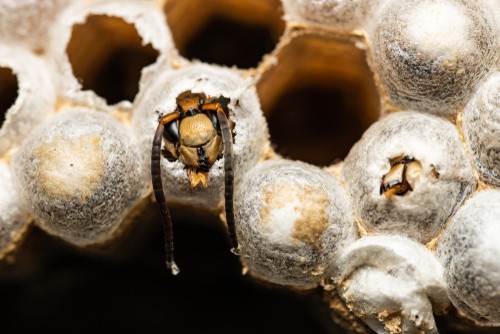
11.11.2025 How did the Asian hornet get to Europe?
The Asian hornet likely arrived in Europe unintentionally and has quickly expanded throughout France and nearby countries. Its adaptability to different environments and the absence of natural predators have contributed to its rapid spread. A single nest can generate several hundred new queens in one breeding season.
Asian Hornet Reporting Form
Please fill out all required fields and submit the form.
Help us!
If you discover an Asian hornet or a nest of this invasive species in Roggliswil, it is of the utmost importance that you report it immediately. The Asian hornet is not only dangerous to humans, but also poses a serious threat to native bee populations and the ecological balance in Switzerland.
Why is it important to report the find?
In regions where the Asian hornet has gained a foothold, it exerts significant pressure on native insects, most significantly honey bees. Through the predation of bees, these hornets catalyze a decrease in pollinator populations, thereby impacting the ecological balance of local flora and agricultural productivity. By reporting sightings, experts can react quickly, remove the hornets or their nests and thus prevent the spread of this invasive species.
Notification form for sightings
Preserving the delicate balance of our ecosystems and protecting the wellbeing of our native insects necessitates your involvement. We urge you to report any suspicions or sightings of the Asian hornet using our dedicated reporting form. With your help, we can intervene promptly and minimize the spread of this dangerous species, ensuring the thriving biodiversity in Switzerland.
Your contribution is crucial in the fight against the Asian hornet in Roggliswil. Together we can protect nature and maintain the balance of our ecosystems;
Thank you for your vigilant attention and your commitment to protecting our environment.
How dangerous is the Asian hornet?
The Asian hornet (Vespa velutina) is a predatory insect that originated in Asia and has spread in recent years to various parts of Europe, including France and now also Switzerland and in Roggliswil. Although it poses a threat to honey bees and native biodiversity, it is generally no more dangerous to humans than other wasp species. Nevertheless, there are some aspects to be aware of:
1. Threat to honey bees: The Asian hornet preys on honey bees, threatening native bee populations. A decline in bees can have a negative impact on pollination and thus on local flora and agricultural production.
2. Stings: As with other wasp and hornet species, the stings of the Asian hornet can also be painful. For most people, the stings are unpleasant but not dangerous. However, people who are allergic to wasp or hornet stings can suffer a severe allergic reaction, which in the worst case can lead to anaphylactic shock.
3. Aggressiveness: Although the Asian hornet is not necessarily more aggressive towards humans than other wasp species, it can become aggressive if it feels threatened, especially near its nest.
4. Ecological effects: Apart from the direct effects on honey bees, the spread of the Asian hornet can also disturb the ecological balance by affecting the populations of other insects.
It should be noted that the Asian hornet and the Asian giant hornet (*Vespa mandarinia*) are distinct species. The giant hornet, nicknamed the "killer hornet," is larger and potentially more dangerous to humans because of its more potent venom and the size of its sting.
If you have discovered a nest, call us immediately: 058 510 22 54
Our hornet professionals in Roggliswil are certified by the VSS.
Frequently Asked Questions About Asian Hornets in Roggliswil
The Asian hornet is known for its stings, which carry the potential for serious or even lethal harm, making it much more dangerous than most other hornet species.
The Asian hornet, a notably large insect, can reach up to 3 cm in length. Its slim black body is adorned with vibrant stripes in orange, yellow, and black, creating an intricate and visually impressive coat.
Known for its tendency to be shy and unassertive, the Asian hornet can surprisingly become extremely active and aggressive in defense when faced with danger and confined spaces.
Humans must exercise extreme caution when dealing with the Asian hornet, as its venom is highly toxic and can cause both intense pain and allergic reactions.
The Asian hornet's venomous sting renders it hazardous, surpassing the pain caused by other wasps and capable of inducing allergic reactions.
If you detect the presence of an Asian hornet, it is recommended to immediately report it to either a regional wild bee protection officer or the dedicated department within the responsible Ministry of Agriculture.
To mitigate the risk of attacks and limit the spread of Asian hornets, reporting their presence is crucial. This species exhibits strong territorial instincts and aggressive tendencies.
When Asian hornets are present in Switzerland, professional hornet control becomes necessary. It is advisable to contact a trustworthy pest control service provider for appropriate action.
No specific protections are assigned to the Asian hornet; nonetheless, it is imperative to closely monitor their numbers and restrict their spread.
In their state of hibernation, Asian hornets may either form groups or assume solitary positions, taking shelter in the corners of walls, structures, garden sheds, occasional residences, or tree hollows.
Would you like more information about Asian hornets? Then take a look at our FAQ's about Asian hornets.
Private inquiry form
For an uncomplicated request to remove an Asian hornet's nest, please use our contact form for private individuals.
Real estate inquiry form
Use our property management order form to request the removal of an Asian hornet's nest.




_3.jpeg)
_3.jpeg)
_3.jpeg)
_3.jpeg)